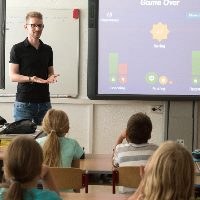(BRUSSELS) – The European Commission published guidelines for teachers in primary and secondary schools Tuesday on how to address disinformation and promote digital literacy in their classrooms.
The guidelines provide practical support for teachers and educators and include definitions of technical concepts, class-exercises and how to encourage healthy online habits. This toolkit covers three main topics: building digital literacy, tackling disinformation, and assessing and evaluating digital literacy.
Currently in Europe, one in three 13-year-olds students lack basic digital skills when directly tested, and according to the OECD, only a little over half of 15-year-olds in the EU reported being taught how to detect whether information is subjective or biased. There is consequently a clear need to strengthen the role of education and training in tackling disinformation and promoting digital literacy as well as media literacy. It will increase resiliency and the possibility to fight the impact of online disinformation more effectively.
The Guidelines presented today were developed with the support of a Commission expert group on tackling disinformation and promoting digital literacy through education and training bringing together a wide range of practice from the world of education and training, broadcast, academia, social media, and journalism. On the same occasion, the expert group also published a report, which analyses the role of education and training in tackling disinformation and presents possible solutions through policy at EU and national level.
The EU executive says it will further invest in this cause through the 2023 Erasmus+ Annual Work Programme, which will provide funding for large-scale forward-looking projects with a focus on teacher training and curriculum development in tackling disinformation and promoting digital literacy.
It will also use the new guidelines for actions to support teachers under the new European strategy for a better internet for kids (BIK+).
Guidelines for teachers and educators on tackling disinformation and promoting digital literacy through education and training – translations into all EU official languages will follow in due time



